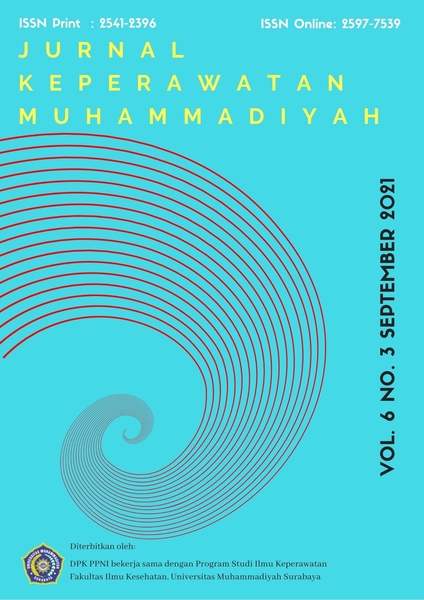Subjective Well Being Pada Penderita Diabetes Melitus (DM) Tipe II Di Srikandi Wound Care, Kabupaten Semarang
DOI:
https://doi.org/10.30651/jkm.v6i3.8878Keywords:
Subjective well-being, Type II Diabetes MellitusAbstract
AbstractChronic diseases such as Diabetes Mellitus (DM) type II can cause profound psychological changes for patients, families and social groups. The positive view of DM sufferers about themselves is an indication of subjective well-being, on the other hand, DM sufferers themselves are an indication of low subjective well-being. Semarang Regency. This research was conducted at Srikandi Wound Care, Semarang Regency from March to April 2021. The method used in this study was qualitative, with data collection techniques using the Subjective Well Being interview guide instrument developed by Diener (2006). There were 5 participants who were determined using purposive sampling technique. The results of the study obtained 6 (six) themes that describe Subjective Well Being in type II DM patients, namely, respondents' experiences related to life satisfaction, happiness, respondents' feelings of sadness, family support, community views and respondents' knowledge regarding type II diabetes mellitus. In conclusion, subjective well-being in participants with Type II Diabetes Mellitus at Srikandi Wound Care refers to aspects of experience related to life satisfaction, participants' happiness, participants' sadness, family support, community views and knowledge related to type II diabetes mellitus.
References
ADA. (2012). Diagnosis and Classification of Diabetes Mellitus. Diabetes Care, 35 (1),(care.diabetes journals.org)
Type 2 Diabetes Mellitus; Population Health Management, 17(4), pp. 253-254.Doi :10.1089/pop.2014.0013
Agborsangaya, C. B., Lau, D., Lahtinen, M., Cooke, T.,& Johnson, J. A. (2013). Health-related quality of life and healthcare utilization in multimorbidity: results of a cross- sectional survey. Quality of Life Research, 22(4), 791-799.
Alan Carr, (2015). Positive Psychology, New York,Brunner-Routledge, h.47.
Arabiyah, Nurul; Imelda, Fivi N; dan Oriza, Ika D. (2008). Hubungan Bersyukur dan Subjective Well Being pada penduduk miskin.
Bakas, T., McLennon, S. M., Carpenter, J. S., Buelow, J. M., Otte, J. L., Hanna, K. M., … Welch, J. L. (2012. Systematic review of health-related quality of life models. Health Qual Life Outcomes, 10(1), 134.
CDC. (2011). Family History as a Tool for Detecting Children at Risk for Diabetes and Cardiovascular Disease
Diner, E., Sollon, C.N., Dan Lucas, R.E. (2003). The evolving concept of subjective well being: The multifaceted nature of happiness. Advances in Cell Aging and Gerontology, vol 15, 187-219.
Dinas Kesehatan Provinsi Jawa Tengah. (2017). Profil Kesehatan Provinsi Jawa Tengah 2016.Semarang : Dinas Kesehatan Provinsi Jawa Tengah
IHE. (2008). IHE Report: The Importance of Measuring Health-related Quality of Life. Alberta: Institute of Health Economics.
Erdiana, Yuyun. (2015). Dukungan Keluarga dalam kunjungan Lansia di posyandu lansia di Desa Karanglo lor Kecamatan Sukorejo Kabupaten ponorogo. KTI. Tidak diterbitkan di ponorogo : Program studi D III Keperawatan Ilmu Kesehatan Universitas Muhammadiyah Ponorogo.
Friedman, Marilyn. (2010). Keperawatan Keluarga Riset, teori, dan Praktek. Edisi 5.Jakarta : EGC
Jellesma, F. C., & Vingerhoets A. J.J.M (2012). sex Roles (Vol. 67, Iss 7, pp. 412-421). Heidelberg, Germany : Springer
Kementerian Kesehatan Republik Indonesia (2018). Profil kesehatan provinsi jawa tengah.hhtp://www.depkes.go.id/article/view/18121200001/prevent-prevent-and-prevent-the voice-of-the-world-fight-diabetes.html.
Kusumadewi, (2011). Peran Stressor Harian, Optimisme dan regulasi diri terhadap Kualitas Hidup Individu dengan Diabetes Melitus Tipe 2
Notoatmodjo, Soekidjo. (2012). Pendidikan dan perilaku kesehatan. Jakarta : Rineka Cipta
Nursari, M., Suniyadewi, N. W., dan Juniantri, N. P. (2013). Hubungan efikasi diri dengan kualitas hidup pada pasien DM di poliklinik interna Blud RSUD
Sanjiwani Gianyar. Keperawatan jiwa, Komunitas dan Management, 1(2),186-192.
Prawitasari, Johana E. (2012). Psikologi Terapan Melintas Batas Disiplin Ilmu. Jakarta ; Erlangga.
Rahayu, I. K. (2015). Kesejahteraan Subjective (subjective well being) pada istri narapidana sekaligus penderita kanker ovarium. UIN Maulana Malik Ibrahim Malang. Diakses pada tanggal 10 Mei 2021 pukul 12: 25.
Rismawanti. (2010). Tugas Kesehatan Mental (Subjective well being). Gunadarma;Jakarta. Diakses pada tanggal 16 juli 2019.
Ryan, R,. M,. & Deci E.L. (2005). On happiness and human potentials; A review of research on hedonic and eudaimonic well being. Annual review of psychology,52, 141-166, 22
Setiawan, Ebta (2018) “Arti kata nelangsa-Kamus Besar Bahasa Indonesia (KBBI)†kbbi.kemdikbud.go.id. Diakses pada tanggal 10 Mei 2021 pukul 12:56.
Tandra, Hans. (2008). Segala sesuatu yang harus anda ketahui tentang Diabetes. Jakarta : Gramedia Pustaka Utama.
Tristina, R. D. (2016). Psychological Well Being in Type 2 Diabetes Mellitus Patients in Mulyorejo public health center Surabaya. Jurnal ners, 11(2), 147
Waspadji S., (2009). Buku ajar penyakit dalam : Komplikasi Kronik Diabetes, mekanisme terjadinya, diagnosis dan strategi pengelolaan, Jilid III, Edisi 4,
Downloads
Published
Issue
Section
License
- Penulis tetap memegang hak atas karyanya dan memberikan hak publikasi pertama kepada jurnal ini yang secara simultan karya tersebut dilisensikan di bawah:Â Creative Commons Attribution-ShareAlike 4.0 International (CC BY-SA 4.0)













